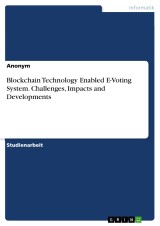Details

Blockchain Technology Enabled E-Voting System. Challenges, Impacts and Developments
1. Auflage
|
15,99 € |
|
| Verlag: | Grin Verlag |
| Format: | |
| Veröffentl.: | 26.10.2020 |
| ISBN/EAN: | 9783346282255 |
| Sprache: | deutsch |
| Anzahl Seiten: | 28 |
Dieses eBook erhalten Sie ohne Kopierschutz.
Beschreibungen
Studienarbeit aus dem Jahr 2020 im Fachbereich Informatik - IT-Security, SRH Hochschule Berlin (früher OTA), Sprache: Deutsch, Abstract: In this paper the author talks about electronic voting systems, requirements, strengths, and challenges associated with them. The paper explores more on Blockchain technology including benefits, impacts, risks in implementing the Blockchain based electronic voting system, and touch upon the current e-voting projects. Finally, the author describes the proposed model for E-Voting system and concludes this report.
Voting is an essential tool for any democratic government, it’s the most important factor which makes government for the people and by the people, until now the paper ballot has been used for voting in most countries of the world where voters mark their vote on the paper and put it in the ballot box and at the end of election the votes are counted, but the biggest disadvantage of this system is that it cannot be auto-mated and voters have to physically go to the location for voting that makes the entire process very time consuming and expensive, also digital ballots are vulnerable to hackers and results can be compromised, with the Blockchain technology and cryptography any user can login in GUI using the credentials provided by national election authority and cast their vote by signing it with their private key and trusted miners could verify whether the votes are legit or not by using voter’s public keys that makes the entire e-voting process transparent, cost effective, safe and secure.
The proposed system consists of a GUI, an application interface, central database, Blockchain network. Pre-election registration process, voting, counting, final election results and auditing were explained. The consensus algorithm was proof-of-work, all the election properties such as validity, privacy, individuality, flexibility etc. were satisfied.
Voting is an essential tool for any democratic government, it’s the most important factor which makes government for the people and by the people, until now the paper ballot has been used for voting in most countries of the world where voters mark their vote on the paper and put it in the ballot box and at the end of election the votes are counted, but the biggest disadvantage of this system is that it cannot be auto-mated and voters have to physically go to the location for voting that makes the entire process very time consuming and expensive, also digital ballots are vulnerable to hackers and results can be compromised, with the Blockchain technology and cryptography any user can login in GUI using the credentials provided by national election authority and cast their vote by signing it with their private key and trusted miners could verify whether the votes are legit or not by using voter’s public keys that makes the entire e-voting process transparent, cost effective, safe and secure.
The proposed system consists of a GUI, an application interface, central database, Blockchain network. Pre-election registration process, voting, counting, final election results and auditing were explained. The consensus algorithm was proof-of-work, all the election properties such as validity, privacy, individuality, flexibility etc. were satisfied.
Diese Produkte könnten Sie auch interessieren:

Autonomic Communication

von: Athanasios V. Vasilakos, Manish Parashar, Stamatis Karnouskos, Witold Pedrycz

149,79 €















